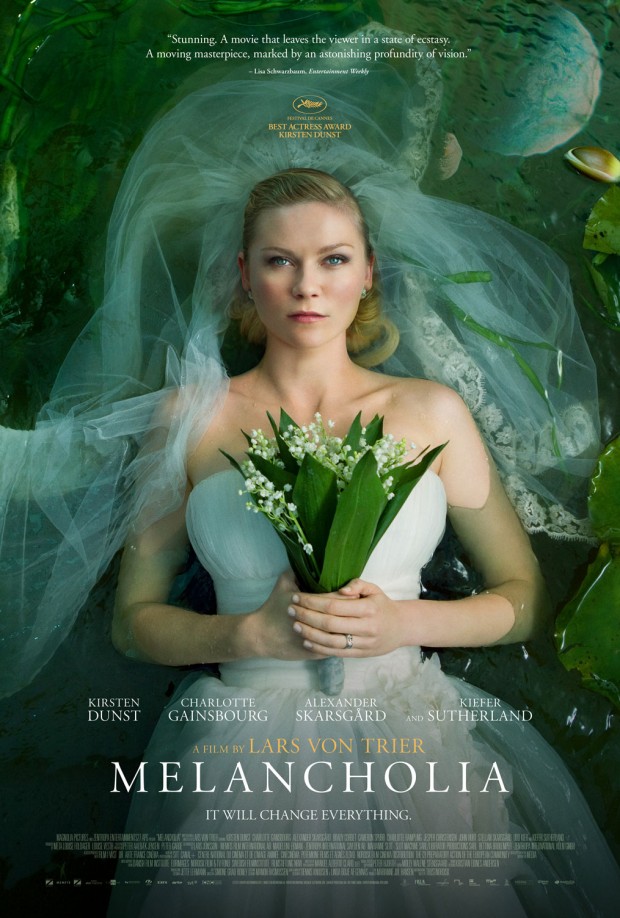It would be too easy to write-off Lars von Trier’s Melancholia as a beautiful, yet incomprehensible drama. It would be even easier to get lost in the inorganic dialogue that spews out of many of the characters’ mouths. In the end, there’s something more important. The horrible wedding and impending apocalypse that guide the picture, which make it feel more experimental than real, are all a farce.
This film is a puzzle that takes far longer than its running time to understand.
Like those old 1,000 piece epic jigsaw puzzles you put together as a child, once you find the heart of the art, the corners attach quite easily. It takes time to find the rest though; they aren’t apparently obvious at first. But, by the end, the desperation the film intended to induce is apparent.
You may not like the way this picture makes you feel, but it’s not meant to be a pillowy experience.
Justine’s [Kirsten Dunst] experiences of pure happiness and fragility are hard to understand for anyone who hasn’t had their own emotional battles. It’s easy to label the storytelling as weak. Especially when it’s impossible to put yourself in a mind that you can never understand. Deliberately sabotaging her wedding by ignoring her husband Michael [Alexander Skarsgard] and later sleeping with an intern from her office, Justine’s actions are irrational and make little sense.
She’s ill. She needs help. Help that her family doesn’t quite comprehend. Sister Claire [Charlotte Gainsbourg] and Brother-in-Law John [Kiefer Sutherland] try their hardest. Claire makes her favorite food- meatloaf- she says it tastes like ashes. Claire later takes Justine for a horse ride that concludes with her beating the animal, one she felt a connection with earlier in the film. Her life is in complete disarray and she can’t stop the madness. Her world is ending.
Luckily, so is the rest of the world. With a planet on a collision course for Earth, everyone’s lives are changing.
Only in the face of sure doom does Justine become the rational one, the rock that is able to make sense of a world that can never make sense of her. On the surface, Melancholia appears to be a disaster flick, but it’s ultimately a coming of age film, which chronicles a time in the life of a woman able to be the person her family needs her to be, in spite of glaring emotional battles with anxiety and depression.
How it gets there is the problem. Some of the characters are throwaways who don’t add much to the overall premise. Skellan Skarsgard’s portrayal of Jack, Dunst’s boss, for instance, feels pulled out a Saturday morning cartoon. Obsessed with garnering a tag line from Justine, he even manages to make it a central part of his wedding toast. His introduction of his nephew to her later is also awkward, as well as the sex scene and conversation between Justine and the lowly nephew afterward. Through these seemingly wackily organized events, which seem horribly stacked on top of one another, it’s hard to escape the feeling of being trapped within the first part of the film. The wedding never seems to end. Not even the charming antics of John Hurt and Sutherland can help the melodramatic and anemic pacing.
Von Trier has his reasons. He feeds off of these people’s most desperate emotions, ones that are spoken, rather than thought disgustingly to one’s self. There’s a beauty in that naturally, but it lacks a logic that can tie the film together accurately.
What does manage to bind the premise of the film together is Manuel Alberto Claro’s cinematography, which is simultaneously colorful, experimental and surreal. The opening scene in spite of its long length, is confusing at first, but ultimately paints a picture of stills that set up the rest of the film and all the scenes, which need more explaining. Several other scenes feel stolen out of museum catalogues. One in particular has Dunst lying naked in the grass stroking her chest as she looks at the moon and Melancholia, as her sister manages to stalk her and see her in a moonlight-induced trance.
The music, Richard Wagner’s “Tristan und Isolde Prelude†that plays at various points in the film is chilling and regardless of its repetitiveness, is able to make these beautifully orchestrated scenes sing. Even if the story wasn’t comprehendible, the film would still be memorable for the serenity of the shots and the score.
But being only edges of the puzzle, which is uncovered, it’s fair to say that Melancholia is an experiment in patience that pieces itself together nicely and ultimately exposes a one of a kind image of sadness.
Even if it doesn’t quite feel that way at first.



Leave a Reply